Army Vietnam War Lemont, IL Flight date: 06/19/24
By Lauren Jones, Honor Flight Chicago Veteran Interview Volunteer
When you drive up to the lovely Lemont home of Dick and Pat O’Connor, you are greeted by blooming flowers in a meticulously landscaped yard, a White Sox flag in the front garden, and the U.S. flag flying high. Dick is openly proud of his roots and his family. He’s also proud that his U.S. flag spent a day flying over the White House in April 1969 while he served our country in Vietnam.
But the journey to this place wasn’t easy as life presented its fair share of challenges to Dick. Growing up in the small town of Peekskill, NY, Dick and his sister lost their dad at the young ages of four and two. The family stayed in New York for a while after his death, but their mom had to relocate often, seeking stability from various family members. From New York to Arizona, then to Clinton, IA, and eventually to Chicago.
During their time in Iowa, Dick and his sister lived at an orphanage run by St. Vincent de Paul. Their mom needed to work long hours and didn’t like the idea of having other people watch them. The strict rules only allowed the children to see their mom once a month.
In 1955, the family moved to Chicago, where his mom got a good job working for U.S. Steel. The kids stayed at what was then called the Angel Garden Orphanage (now Misericordia Home North). His mom remarried in 1959, and the kids could finally leave the orphanage and move home.
In his late teens, Dick was happy working for a local landscaper, earning money so he could get out of school early and pay for things like prom. “I really did like it and was good at it. We worked all the time. I got pretty burned up from working outside but liked it and worked every day. My boss was really good at what he was doing, and every time he said he wanted me there, I was there for him. I even worked the morning of my own graduation party!”
“That was enough.”
When he was 20 years old, Dick was drafted into the Army. He explains, “Well, I knew it was coming. Yeah. Me and a buddy of mine, we kind of like pushed our numbers up a little bit. His brother got killed in Nam, and he wanted to go there. But he ended up going to Korea. And I was the one who went to Nam.”
Shortly before leaving for basic training, Dick broke his arm in a car accident. He could only straighten his arm a little, so he thought he might not have to go to war. He was wrong but was also shown a little mercy in the length of time he needed to be there.
He explains, “During basic, I kept going to medical, and an orthopedic doctor from Boston told me I had two choices. He could fix my arm, and I could get redrafted, or he could fix my arm and give me all the time I needed to get healthy.”
Dick gladly chose the latter option, which is why – even though he was drafted in September 1967 – he ended up spending only eight months in Vietnam, from January – August 1969. But as Dick will quickly inform you, “that was enough.”
“After I got the plate out, I went back to basic at Fort Leonard Wood and AIT at Fort Polk. They had a non-commissioned officer school at Fort Benning, so we got to work with the Rangers doing all their training. Someone kept telling me to become a non-commissioned officer because you get more money when you go to Nam and can decide on what you want to do. So that’s what I did.”
As a Sergeant, Dick was able to help “push troops” at Fort Polk, which included training them for combat. He did this until January 1969, when he left for Vietnam.
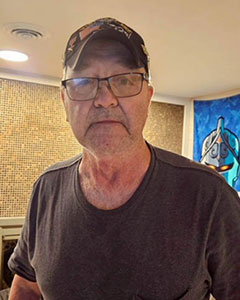
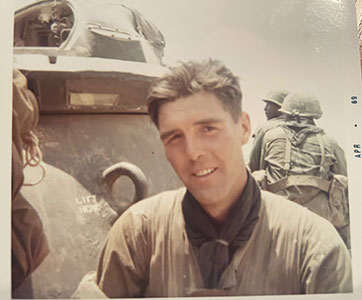
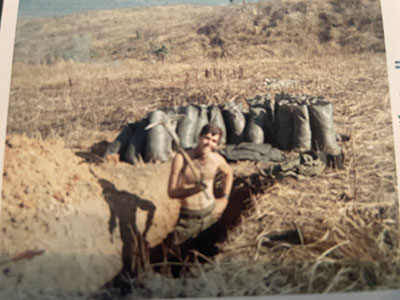
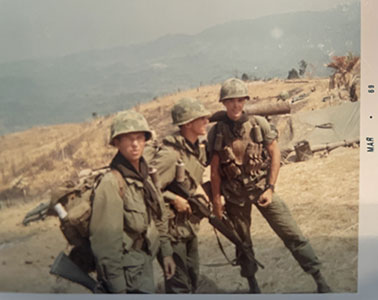
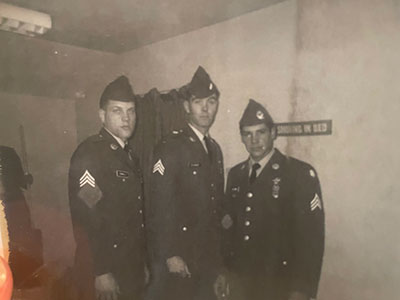
Serving in Vietnam
Dick was stationed at many bases, including Fire Base 5, 34, and LZ Judd, and was Squad Leader with Company C, 1st Battalion, 22nd Infantry, 4th Infantry Division.
“We were on Fire Base 5 and called it ‘Battalion Toc’ because all the big shots were on that hill. It was a major hill we took over the year before during the Tet Offensive. I was an Alpha team leader for the squad. We had firefights and snipers shooting at us, but they were just taking potshots. We were on a lot of LZs, which is a landing zone. A chopper would place a group of us where there’s a lot of elephant grass. And we would then have to burn the elephant grass to dig your fox holes. And that was an experience.
“We did two different types of missions, basically. One was called an alligator, and that was going out for ten days chasing Charlie. Then we also had one called green eyes. And that was more of an observation post. So, they would send you to a grid, and you would stay there to watch and listen. That was pretty cool. You went out for three nights and four days with two other guys. You were usually set up in a position, but other times, they would tell you to move because they thought someone was out there.
“We slept out there, got our mail, got ice cream. One time I was attached to a bunch of tanks, moving with them. Just to make sure Charlie wasn’t bothering them. The guys driving the tanks were good guys and would let us jump on so we didn’t have to walk.
“I had an NVA soldier who turned what they call Chieu Hoi with me. He came over to our side, and the government paid them money to care for their family. I didn’t want him but I took him in, and he didn’t do anything wrong. He was good and taught me a lot of things that I didn’t know at the time. But I’ve had nightmares about him at times. Now, with the medication I’m on, I don’t have bad dreams anymore. But it’s taken years.”
The story behind his Bronze Star Medal
Dick earned a Bronze Star for an exemplary act of heroism on April 3, 1969. And while Dick is proud to have earned the medal, this day also signifies losing a good friend to the war.
His unit was operating in the Cu-Don Valley complex west of Kontum when an armed hostile force of an unknown size engaged them. Several men were wounded in the initial attack by heavy fire, and the remainder of them were pinned down. Every time they tried to move, they were hit.
Dick explained, “We were the point platoon for the company, so we all ran down once we got hit. But then we all got pinned down and couldn’t get any help. We tried. We called in. They wouldn’t send anyone, and then right around hour 10 of being pinned down, we got a call from a chopper. They were going to come in. He told me, ‘The first chopper is going to take all the fire, and the second chopper will fire at the enemy. When you see that happening, make a move. Be ready to move’.”
Dick knew that he had to get his men to a less dangerous and more advantageous position, so he moved to a point on the battlefield where he could observe more. Once there, he engaged with a North Vietnamese B-40 rocket, eliminating the threat. Once the choppers arrived, and without regard for his own safety, he then repeatedly exposed himself to hostile fire as he deployed his squad to positions from which they could more effectively engage the enemy.
“I was lucky, but I should have been shot dead on that day. Me and this one guy were firing at each other, and his rounds were right in the dirt, and the dirt was flying in my face. I’ve never forgotten that. We were all sitting on the hill when we finished that day. And it’s funny that I was trying to light my cigarette and couldn’t. I was shaking so much from the contact we had.”
Although his courageous actions undoubtedly saved a few lives that day, he lost his friend, Ron Hacker. Still clearly shaken by the memory, Dick explains, “He was with our platoon when we got hit. He was a nice guy who knew what he was doing, but you know, it just happened.
“The night before we got hit, Ron said, ‘You know what, Sarge? Twenty-four hours from now, shit will be over.’ I looked at him funny enough to ask how he figured that out, but he said nothing. Then, the next day, he got killed. I do not know why he said that, but I will never forget it.
“I helped put his body in the poncho liner and rope him up. We were getting him in the chopper to send his body home. And when we lifted him, all his blood just poured all over me. So that’s something that I always remember.
Ron was married, but I could never get myself to reach out to her about it. It was too hard for me to talk about it at the time. It was a shame that he died.” Ron Hacker received a Silver Star Medal posthumously.
Dick received his Bronze Star Medal the same day he left Vietnam. “We got on the chopper, and I was laying down there, and I kept saying, ‘You’d better get me back!’.”
Long-lasting health effects
Dick is a big supporter of mental health treatment and wishes he would have gotten help sooner. “How the hell did I survive all that? The first day I was evaluated, the doctor told me, ‘Oh yeah. You got PTSD, buddy. We’re going to have to work on you.’
“I remember first coming home and hearing a truck backfire. And boy, you talk about hitting the ground! I’ve never forgotten about it.”
After years of suffering, he finally got help and has been speaking with his therapist, Ralph, every few weeks for the past 20 years. Dick has Type 2 Diabetes and other health complications, including infrequent bouts of vertigo. Some ailments have been tied back to Agent Orange, and Dick believes it could also be the cause of his daughter Jenny being born with microcephalus. He tells the story of Jenny with a heavy heart but also lights up when he talks of her love for country music and their shared passion for Notre Dame football.
Life after the war
On September 12, 1970, Dick married Pat, whom he had met three weeks before Vietnam on a blind date. They are close to their four kids and now enjoy four grandkids who all live locally. He has a passion for genealogy and learning as much as possible about his ancestors, including his grandfather, a Major League Baseball player. Dick laughs that his grandfather was great at bat and in the field, but he was terrible at running.
Dick went back to work as a landscaper until he was diagnosed with Diabetes. He then spent 28 years with Illinois Bell and some time working for his brother-in-law at a sheet metal company where his sister was the CEO. He spent the last ten years of his career with Laser, an underground construction company that installed sewers. He loved this work and was treated like part of the family. Once the company went under in 2010, Dick decided it was time to retire. He’d already had two knee operations and knew it was time.
For the past 10 years, Dick has met up with local veterans once a month for breakfast. They are from the same trucking outfit, and all know each other. They’ve welcomed Dick, and he’s happy to join them for breakfast and good conversation whenever he’s able to attend.
He still wears a Vietnam bracelet of a soldier who went missing. He asked for someone who was at least a Sergeant. They never found his body, and although Dick didn’t know him, he wears the bracelet every day in his honor.
Dick is really looking forward to June 19th, the day of his Honor Flight. He has seen the Vietnam Traveling Memorial Wall but has never been to Washington, DC. He’s hopeful he’ll feel good and looks forward to spending the day with his good buddy, Freddy Parons. He also wanted to thank family and friends for helping him now that he can no longer drive.
Thank you, Dick, for your dedication and service. We hope you enjoy your day!


